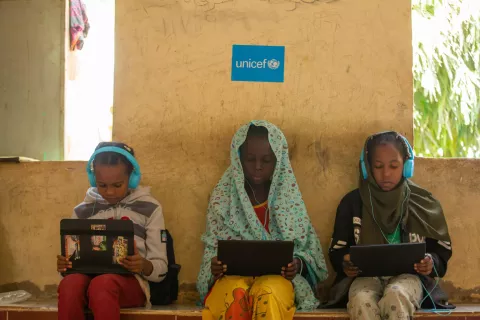Syrian families flee fighting in Raqqa, as humanitarian needs increase
Humanitarian assistance to the area has been highly restricted for the past three years and children have suffered immensely

- Available in:
- English
- Français
As military operations scale up in the Raqqa area families are fleeing the violence. Winter is fast approaching and UNICEF is working to get clothing, blankets, food and clean water to the displaced children and their families.
AIN ISSA/DAMASCUS, Syrian Arab Republic, 17 November 2016 – Fatima woke in the middle of the night to the raging sounds of fighting and shelling in her village outside Raqqa. She grabbed a few belongings and led her seven children into the wilderness.
“We waited till dawn to head to Ain Issa,” said the 37-year-old mother. “I wanted to save myself and my children.”
Like Fatima, more than 5,000 people have fled their homes over the past week to escape the fighting as reported military operations in ISIL-controlled Raqqa city scale up.
UNICEF and its partners estimate that around 175,000 children could be affected by the violence.
Children in Raqqa have suffered immensely over the past three years. Access to the area has been highly constrained due to insecurity and restrictions on the delivery of humanitarian assistance. The last UN inter-agency aid convoy to Raqqa was in October 2013.

The terrifying plight of Raqqa’s children
Displaced families, mostly women, children and the elderly were huddled together in the back of trucks with whatever belongings they managed to take with them. Some carried mattresses and blankets, while others brought their livestock, including goats, cows and sheep.
“I was so scared on the way when I heard shooting,” said 13-year-old Ahmad who had to flee his home barefoot. “I thought I was going to die,” he added as he and his family were nearing the town of Ain Issa, the main staging point for uprooted families, some 50 km north of Raqqa city.
While some families managed to find shelter with relatives in nearby villages, others like 26-year-old Suad are temporarily staying in an old warehouse.
“We want food, water and blankets,” Suad said. “We are in the desert here, it’s very cold,” she added.
She recalls the dangerous trip that her family made. “The road was very bad. When we were in the wilderness, we heard the sounds of airplanes and shelling and got very scared,” she said. “Children started crying and dust filled our eyes.”
Providing for children’s immediate needs
While the situation in the Raqqa area continues to evolve, UNICEF is pre-positioning supplies in various locations to provide critical support for displaced children and their families.
“It’s essential that children fleeing this violence are protected and have access to their basic needs as soon as possible,” said Hanaa Singer, UNICEF Syria Representative. “These children have already been through so much and with winter fast approaching we must also protect them from the bitter cold.”
UNICEF calls for urgent additional funding so that children receive the full range of services that they desperately need.
UNICEF is preparing a package of items to provide winter clothing and thermal blankets, as well as critical hygiene and medical kits. Micronutrients, therapeutic food and vaccinations to improve the nutritional and health of these children will also be available. Water trucking, network repairs and chlorination will provide safe water and reduce the likelihood of waterborne diseases.
Materials to support psychosocial activities, as well as recreational and educational kits will also be provided to help children restart their learning and resume some normality in life.




